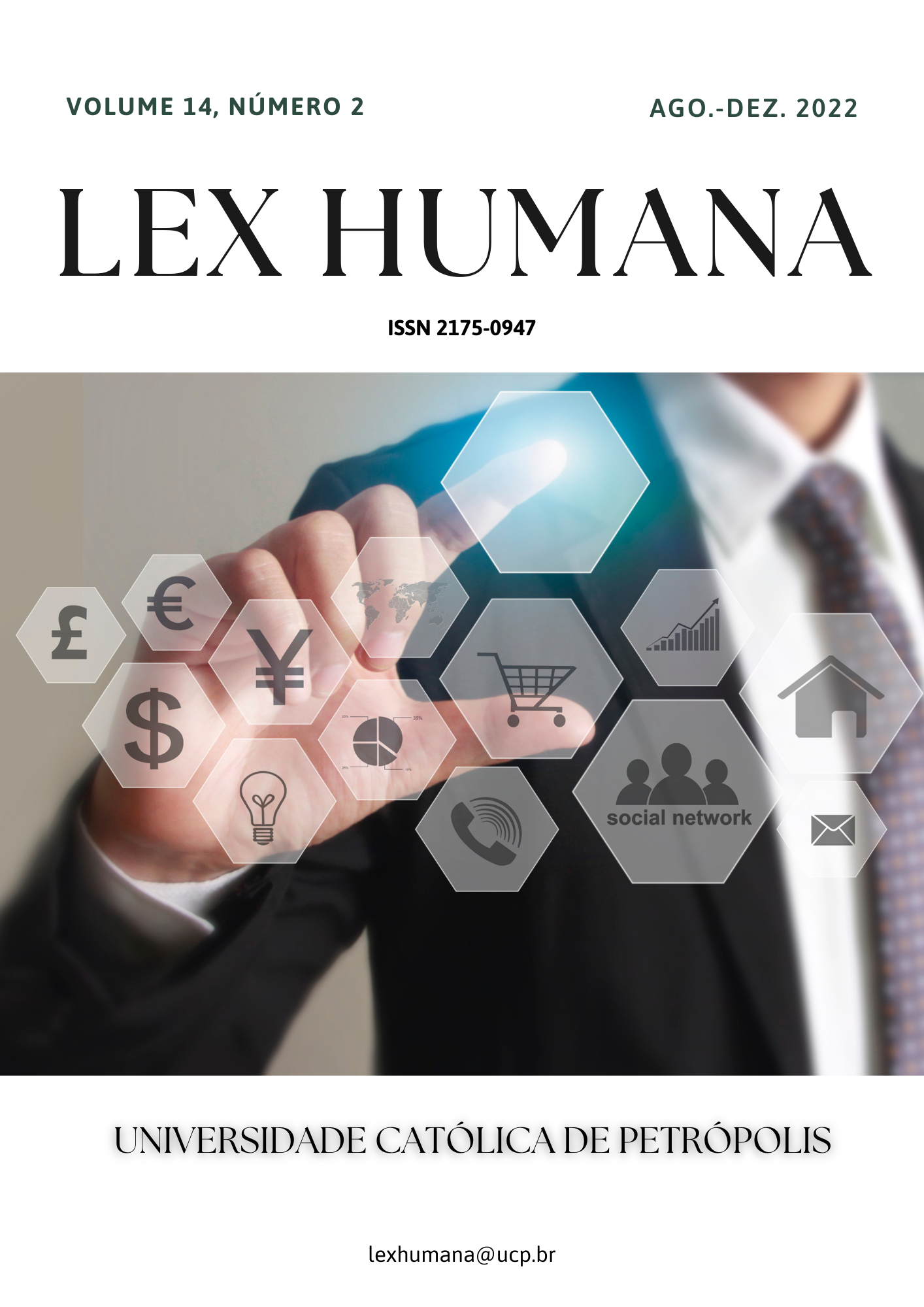Resumo
O artigo analisa um dos tipos de emprego atípico - trabalho remoto e as emendas adotadas ao Capítulo 49.1 do Código do Trabalho da Federação Russa. Os autores consideram o trabalho à distância como uma forma especial de emprego que permite utilizar os recursos de mão-de-obra durante uma pandemia e outras emergências de forma mais eficiente, refletindo a flexibilidade da regulamentação legal das relações de trabalho na Federação Russa. Os autores analisaram certas disposições da legislação trabalhista no campo do trabalho à distância, e também utilizaram métodos de pesquisa como histórico, controverso, envolvido, dedução, identificação-análise legal. Foi determinada a importância do emprego à distância, que consiste na capacidade de trabalhar nas condições da distribuição moderna da população, no uso de tecnologias inovadoras, no desenvolvimento do mercado de trabalho, refletindo a melhoria do papel social do emprego atípico, o desenvolvimento econômico e técnico do país. Os autores analisaram as garantias legais dos trabalhadores à distância no desempenho de suas funções de trabalho. Foi chamada a atenção para os aspectos positivos e negativos da regulamentação legal do emprego à distância. O artigo prestou atenção aos problemas sistêmicos no estabelecimento das condições de trabalho dos trabalhadores à distância. O artigo também revelou os problemas de aplicação das disposições hoteleiras do Código do Trabalho da Federação Russa e fundamenta as orientações para superá-las.
Referências
Baieva, N. A., Burkin, D. O., Vysheslavova, T. F., & Lukinova, S. A. (2017). Kontseptsiya sotsialnogo gosudarstva i ee realizatsiya v Rossiiskoi Federatsii [The concept of the welfare state and its implementation in the Russian Federation]. Journal of Advanced Research in Law and Economics, 8(5), 1446-1455.
Baieva, N. A., Vysheslavova, T. F., & Lukinova, S. A. (2019). Printsip spravedlivosti v prave sotsialnogo obespecheniya [The principle of equity in social security law]. Journal of Advanced Research in Dynamical and Control Systems, 11(SI 8), 2754-2759.
Bezbakh, V. V., Koncheva, V. A., & Mendosa-Molina, S. V. (2018). Osobennosti pravovogo regulirovaniya truda distantsionnykh rabotnikov [Features of legal regulation of labor of teleworkers]. Probely v rossiiskom zakonodatelstve, 3, 244-246.
Kasevich, E. V., Atayan, G. Yu., Amvrosova, O. N., Stankevich, G. V., & Kara-Kazaryan, T. V. (2019). Financial control as a legal institution: A comparative legal analysis of the Russian and EU expertise. In E. Popkova, V. Ostrovskaya (Eds.), Perspectives on the use of new information and communication technology (ICT) in the modern economy. ISC 2017. Advances in intelligent systems and computing (Vol. 726, pp. 439-445). Cham, Switzerland: Springer. https://doi.org/10.1007/978-3-319-90835-9_52
Klyukovskaya, I. N., Cherkashin, E. Y., Gabrilyan, R. R., Semenov, V. Y., & Melekayev, R. K. (2018). Methodological basis of the theoretical and legal research of integration processes in modern states. International Journal of Engineering and Technology, 7(4.38), 261-264. http://dx.doi.org/10.14419/ijet.v7i4.38.24478
Koncheva, V. A., & Odintsov, S. V. (2018). Aktualnye voprosy pravovogo regulirovaniya truda otdelnykh kategorii rabotnikov [Topical issues of legal regulation of labor of certain categories of workers]. Imushchestvennye otnosheniya v Rossiiskoi Federatsii, 12(207), 25-30. http://dx.doi.org/10.24411/2072-4098-2018-10123
Korshunova, T. Yu. (2020). Dogovor o distantsionnoi rabote kak sposob oformleniya netipichnykh trudovykh otnoshenii [A teleworking agreement as a way to formalize an atypical employment relationship]. Zhurnal rossiiskogo prava, 2, 112-125. https://doi.org/10.12737/jrl.2020.021
Navasardova, E. S., Nutrikhin, R. V., Zinoveva, T. N., Shishkin, V. A., & Zholudeva, Yu. V. (2018). Kodifikatsiya prirodno-resursnogo zakonodatelstva v Rossiiskoi imperii [Modification of natural resource legislation in the Russian Empire]. Journal of Advanced Research in Law and Economics, 9(1), 183-193.
Smirnov, D. A., & Strus, K. A. (2015). General scientific analysis of implementation of principles of law in the contemporary Russian legal basis. Indian Journal of Science and Technology, 8(S10), 84867. https://doi.org/10.17485/ijst/2015/v8iS10/84867
State Duma Committee on Labor, Social Policy and Veterans Affairs. (2020). Draft Federal law "On amendments to the Labor Code of the Russian Federation regarding the regulation of remote work" of June 16, 2020 No. 973264-7. https://sozd.duma.gov.ru/bill/973264-7
State Duma of the Federal Assembly of the Russian Federation. (1994). The Civil Code of the Russian Federation No. 51-FZ of November 30, 1994. Sobranie Zakonodatel’stva Rossiiskoi Federatsii [SZ RF] [Collection of Legislation of the RF] 05.12.1994, No. 32, Item 3301.
State Duma of the Federal Assembly of the Russian Federation. (2001). The Labor Code of the Russian Federation No. 197-FZ of December 30, 2001. Sobranie Zakonodatel’stva Rossiiskoi Federatsii [SZ RF] [Collection of Legislation of the RF] 07.01.2002, No. 1 (Part 1), Item 3.
State Duma of the Federal Assembly of the Russian Federation. (2020). Federal law of December 29, 2020 No. 477-FZ “On amendments to the Labor Code of the Russian Federation”. Sobranie Zakonodatel’stva Rossiiskoi Federatsii [SZ RF] [Collection of Legislation of the RF] 04.01.2021, No. 1 (Part 1), Item 16.
Stepanov, V. (2013). Distantsionnye rabotniki – Novaya kategoriya rabotnikov v rossiiskom trudovom prave [Remote workers – A new category of workers in Russian labor law]. Trudovoe pravo, 6, 9-12.
Supreme Court of the Russian Federation. (2019). The Definition of the Judicial Board for Civil Cases of the Supreme Court of the Russian Federation of September 16, 2019, No. 5-KG19-106. https://www.vsrf.ru/stor_pdf.php?id=1820422
Tarusina, N. N., Lushnikov, A. M., & Lushnikova, M. V. (2017). Sotsialnye dogovory v prave: Monografiya [Social contracts in law: Monograph]. Moscow, Russia: Prospect.
Vasileva, Yu. V., Shuraleva, S. V., & Braun, E. A. (2016). Pravovoe regulirovanie distantsionnoi raboty: Problemy teorii i praktiki: Monografiya [Legal regulation of teleworking: Problems of theory and practice: Monograph]. Perm', Russia: PGNIU.
Zakalyuzhnaya, N. V. (2019). Osnovnye cherty distantsionnoi zanyatosti [Main features of distance employment]. Trudovoe pravo v Rossii i za rubezhom, 4, 37-40.
Zhuzhgov, I. V., Volkov, A. A., Salnyi, A. M., Kulikova, T. B., & Ryasnyanskaya, N. A. (2019). Monitoring pravovogo prostranstva: Teoretiko-pravovye aspekty [Monitoring the legal space: Theoretical and legal aspects]. Opcion, 35(20), 2337-2365.

Este trabalho está licenciado sob uma licença Creative Commons Attribution-NonCommercial-NoDerivatives 4.0 International License.
Copyright (c) 2022 Lex Humana (ISSN 2175-0947)

